MP Board Class 12th Maths Important Questions Chapter 5A Continuity and Differentiability
Continuity and Differentiability Important Questions
Continuity And Differentiability Objective Type Questions:
Question 1.
Choose the correct answer:
Question 1.
If x = at2, y = 2at, then \(\frac{dy}{dx}\) will be:
(a) t
(b) t2
(c) \(\frac{1}{t}\)
(d) \(\frac { 1 }{ t^{ 2 } } \)
Answer:
(c) \(\frac{1}{t}\)
Question 2.
If y = 2\(\sqrt { cot(x^{ 2 }) } \) ,then \(\frac{dy}{dx}\) will be:
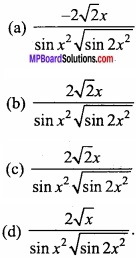
Answer:
(a) 
Question 3.
The value of \(\frac{d}{dx}\) (x3 + sin x2) is to be:
(a) 3x2 + cos x2
(b) 3x2 + x sin x2
(c) 3x2 + 2x cos x2
(d) 3x2 + x cos x2
Answer:
(c) 3x2 + 2x cos x2
Question 4.
The value of \(\frac{d}{dx}\) ax is to be:
(a) ax
(b) ax loga e
(c) ax loge a
(d) \(\frac { a^{ x } }{ log_{ e }a } \)
Answer:
(c) ax loge a
Question 5.
If y = 500e7x + 600e-7x, then the value of \(\frac { d^{ 2 }y }{ dx^{ 2 } } \) will be:
(a) 45 y
(b) 47 y
(c) 49 y
(d) 50 y
Answer:
(c) 49 y
Question 2.
Fill in the blanks:
- Differential coefficient of cos x0 w.r.t x is ……………………………..
- Differential coefficient of elogea w.r.t x is ……………………………….
- Differential coefficient of loge a w.r.t x is ………………………………
- Differential coefficient of ax w.r.t x is ……………………………….
- Differential coefficient of sin 3x w.r.t x is ……………………………….
- If y = sin-1 (2x \(\sqrt { (1-x^{ 2 }) } \)), then \(\frac{dy}{dx}\) = ………………………………
- Differential coefficient of sin x w.r.t. cos x is …………………………………..
- The value of \(\frac{d}{dx}\) (log tan x) is ………………………………………
- Differential coefficient of log (log sin x) ………………………………
- If x = y\(\sqrt { (1-y^{ 2 }) } \), then \(\frac{dy}{dx}\) will be …………………………………
- nth differentiation of sin x will be ………………………………………
- If y = \(\sqrt { x+\sqrt { x+……..\infty } } \), then \(\frac{dy}{dx}\) will be ……………………………….
- If x = r cos θ, y = r sin θ, then \(\frac{dy}{dx}\) will be ………………………..
- Differential coefficient of ex w.r.t \(\sqrt { x } \) will be ………………………….
Answer:
- – \(\frac { \pi }{ 180 } \) sin x0
- 0
- 0, 4
- loge a.ax
- cos 3x
- \(\frac { 2 }{ \sqrt { 1-x^{ 2 } } } \)
- – cot x
- 2 cosec 2x
- \(\frac { cotx }{ logsinx } \)
- \(\frac { \sqrt { 1-y^{ 2 } } }{ 1-2y^{ 2 } } \)
- sin (\(\frac { n\pi }{ 2 } \) + x)
- \(\frac { 1 }{ 2y-1 } \)
- – cot θ
- 2\(\sqrt { x } \)ex.
Question 3.
Write True/False:
- Differential coefficient of elogex is \(\frac{1}{x}\)?
- If f(x) = \(\sqrt { x } \); x>0, then value of f'(2) is \(\frac { 1 }{ 2\sqrt { 2 } } \)?
- Any function f(x) is said to be differentiatiable at any point x = a when Lf'(a) ≠ Rf'(a)?
- Differential coefficient of sec-1a w.r.t x is 0?
- If y = Aemx + Be-mx, then \(\frac { d^{ 2 }y }{ dx^{ 2 } } \) = – m2y?
- If y = sin-1( \(\frac { x-1 }{ x+1 } \) ) + cos-1 ( \(\frac { x-1 }{ x+1 } \) ), then \(\frac{dy}{dx}\) = 0?
- Every differentiatiable function is continous?
- Differential coefficient of a2x is a2x logea?
Answer:
- Flase
- True
- Flase
- False
- True
- True
- True
- Flase
Question 4.
Match the Column:
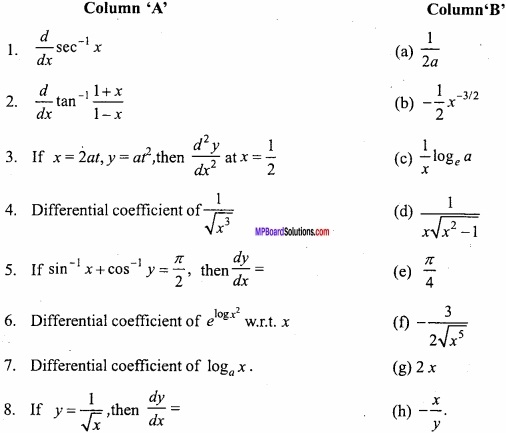
Answer:
- (d)
- (e)
- (a)
- (f)
- (h)
- (g)
- (c)
- (b)
Question 5.
Write the answer in one word/sentence:
- Find differential coefficient of \(\frac { 6^{ x } }{ x^{ 6 } } \) w.r.t. x?
- Find differential coefficient of y = logetanxw.r.t x?
- Find nth derivative of ax?
- If y = sin(ax + b), then find the value of \(\frac { d^{ 2 }y }{ dx^{ 2 } } \)?
- If x2 + y2 = sin xy, then find the value of \(\frac{dy}{dx}\)?
- Find differential coefficient of log tan \(\frac{x}{2}\) w.r.t. x?
- Find differential coefficient of sin-1 \(\frac { 2x }{ 1+x^{ 2 } } \) w.r.t. x?
- Find differential coefficient of e-logex w.r.t x?
Answer:
- \(\frac { 6^{ x } }{ x^{ 6 } } \) [log 6 – \(\frac{6}{x}\) ]
- sec2 x
- ax(logea)n
- -a2y
- \(\frac { ycosxy-2x }{ 2y-xcosxy } \)
- cosec x,
- \(\frac { 2 }{ 1+x^{ 2 } } \)
- – \(\frac { 1 }{ x^{ 2 } } \)
Continuity And Differentiability Short Answer Type Questions
Question 1.
Find all the points of discontinuity of f, when f is defined as:
f(x) = \(\left\{\begin{array}{lll}
{2 x+3,} & {\text { if }} & {x \leq 2} \\
{2 x-3,} & {\text { if }} & {x>2}
\end{array}\right.\) (NCERT)
Solution:
For x< 2, f(x) = 2x + 3 is polynomial function.
Hence, for x < 2, f(x) is continuous function. For x > 2, f(x) = 2x – 3 is polynomial function.
Hence, x > 2, f(x) is continous.
Now, we shall examine the continuty of f(x) at x = 2 only.
Put x = 2 + h,
When x → 2, then h → 0
![]()
= 2(2 + 0) – 3 = 4 – 3 = 1.
Put x = 2 – h,
When x → 2, then h → 0
![]()
= 2(2 – 0) + 3 = 7
f(2) = 2(2) + 3 = 7
![]()
Hence, f(x) is discontinous at x = 2 only.
Question 2.
Find all the points of discontunity of f, when f is defined as follow:
f(x) = \(\left\{\begin{array}{ccc}
{\frac{|x|}{x},} & {\text { if }} & {x \neq 0} \\
{0} & {\text { if }} & {x=0}
\end{array}\right.\). (NCERT)
Solution:
Hence, we shall examine the continuty of f(x) at x = 0 only,
Put x = 0 + h,
When x → 0, then h → 0
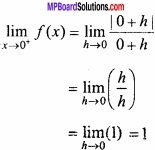
Put x = 0 – h,
When x → 0, then h → 0
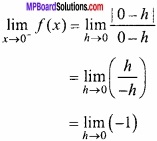
= -1
Given: f(0) = 0
![]()
Hence, the given function f(x) is discontinous at x = 0.
Question 3.
Examine the continuty of function f(x) at point x = 0?
f(x) = \(\left\{\begin{array}{cc}
{\frac{1-\cos x}{x^{2}},} & {x \neq 0} \\
{\frac{1}{2},} & {x=0}
\end{array}\right.\)
Solution:
f(x) = \(\frac { 1-cosx }{ x^{ 2 } } \), when x ≠ 0.
Put x = 0 + h, when x → 0, then h → 0
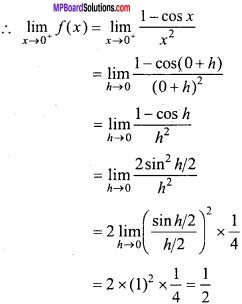
Again, put x = 0 – h, when x → 0, then h → 0

Hence, f(x) is continous at x = 0.
Question 4.
Function f is defined as:
f(x) = \(\left\{\begin{aligned}
\frac{|x-4|}{x-4} ; & x \neq 4 \\
0 ; & x = 4
\end{aligned}\right.\)
Then prove that function f is continous function for all points except x = 4?
Solution:
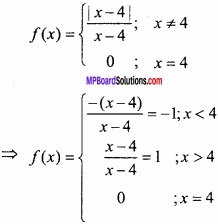
Hence, for x = 4 the function f(x) is dicontinous
![]()
When x < 4 then f(x) = -1 which is constant function Hence, it is continous function when x > 4 then f(x) = 1 which is constant function.
Hence, it is continous function
The given functions f is continous at all points except x = 4. Proved.
Question 5.
Find the value of k for which the function
f(x) = \(\left\{\begin{array}{c}
{\frac{k \cos x}{\pi-2 x}, \text { if } x \neq \frac{\pi}{2}} \\
{3, \text { if } x=\frac{\pi}{2}}
\end{array}\right.\)
is contionuous at x = \(\frac { \pi }{ 2 } \). (NCERT)
Solution:
Put x = \(\frac { \pi }{ 2 } \) + h,
When x → \(\frac { \pi }{ 2 } \), then h → 0

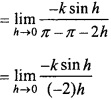
\(\frac{k}{2}\) × 1 = \(\frac{k}{2}\)
Put x = \(\frac { \pi }{ 2 } \) – h
When x → \(\frac { \pi }{ 2 } \), then h → 0
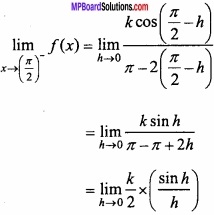
\(\frac{k}{2}\) × 1 = \(\frac{k}{2}\)
Given that f ( \(\frac { \pi }{ 2 } \) ) = 3
The given function is continous,

\(\frac{k}{2}\) = \(\frac{k}{2}\) = 3
k = 6.
Question 6.
Find the value of k, if function
f(x) = \(\left\{\begin{array}{lll}
{k x+1,} & {\text { if }} & {x \leq \pi} \\
{\cos x,} & {\text { if }} & {x>\pi}
\end{array}\right.\) is continous at x = π? (NCERT)
Solution:
Put x = π + h,
When x → π, then h → 0
![]()
= cos (π + 0)
= -1.
Put x = π – h,
When x → π, then h → 0
![]()
= k(π – 0) + 1
= πk + 1
f(π) = kπ + 1
∴ The given function is continous at x = π
![]()
-1 = kπ + 1 = kπ + 1
kπ = -2
k =- \(\frac { 2 }{ \pi } \)
Question 7.
Function f is continous at x = 0:
f (x) = \(\left\{\begin{array}{c}
{\frac{1-\cos k x}{x \sin x} ; x \neq 0} \\
{\frac{1}{2} \quad ; x=0}
\end{array}\right.\) Find the value of k?
Solution:
Given:
f(x) = \(\frac { 1-coskx }{ xsinx } \), x ≠ 0
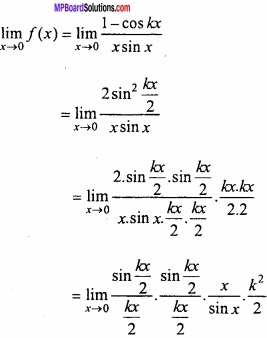
![]()
Given: f(0) = \(\frac{1}{2}\)
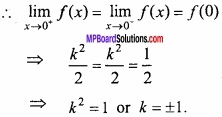
Question 8.
Find the relationship between a and b so the following function f defined by:
f(x) = \(\left\{\begin{array}{lll}
{a x+1,} & {\text { if }} & {x \leq 3} \\
{b x+3,} & {\text { if }} & {x>3}
\end{array}\right.\) is continous at x = 3. (NCERT; CBSE 2011)
Solution:
Put x = 3 + h,
When x → 3, then h → 0
![]()
= b(3 + 0) + 3
= 3b + 3
Put x = 3 – h,
When x → 3, then h → 0
![]()
= a(3 – 0) + 1
= 3a + 1
f(3) = 3a + 1
The given function is continous at x = 3.
![]()
3b + 3 = 3a + 1 = 3a + 1
3a + 1 = 3b + 3
3a = 3b + 2
a = b + \(\frac{2}{3}\).
Question 9.
Prove that the funcion f(x) = |x – 1|, x ∈ R is not differentiable at x = 1? (NCERT)
Solution:
Given:

f(1) = 1 – 1 = 0
Put x = 1 – h, when x → 1, then h → 0
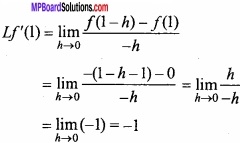
Put x = 1 + h, when x → 1, then h → 0

Lf'(1) ≠ Rf'(1)
Question 10.
Show that the function:
f(x) = \(\left\{\begin{aligned}
x-1, & \text { if } x<2 \\
2 x-3, & \text { if } x \geq 2
\end{aligned}\right.\), is not differentaible at point x = 2?
Solution:
We know that:
RHD =
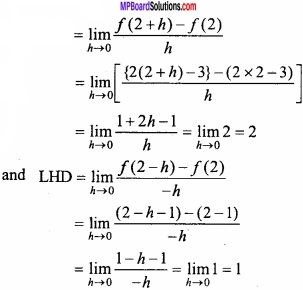
From the above, it is clear that,
LHD at x = 2 ≠ RHD at x = 2
∴ f(x) is not differentiable at x = 2. Proved.
Question 11.
Determine the function of defined by
f(x) = \(\left\{\begin{array}{cc}
{x^{2} \sin \frac{1}{x},} & {\text { when } x \neq 0} \\
{0,} & {\text { when } x=0}
\end{array}\right.\) in continous function? (NCERT)
Solution:
Here, f(0) = 0

![]()
= 0 × a finite quantiy, [∵ sin \(\frac{1}{h}\) is between -1 and 1]
= 0
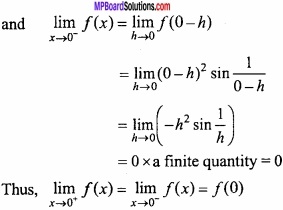
Hence, the given function is continous at x = 0.